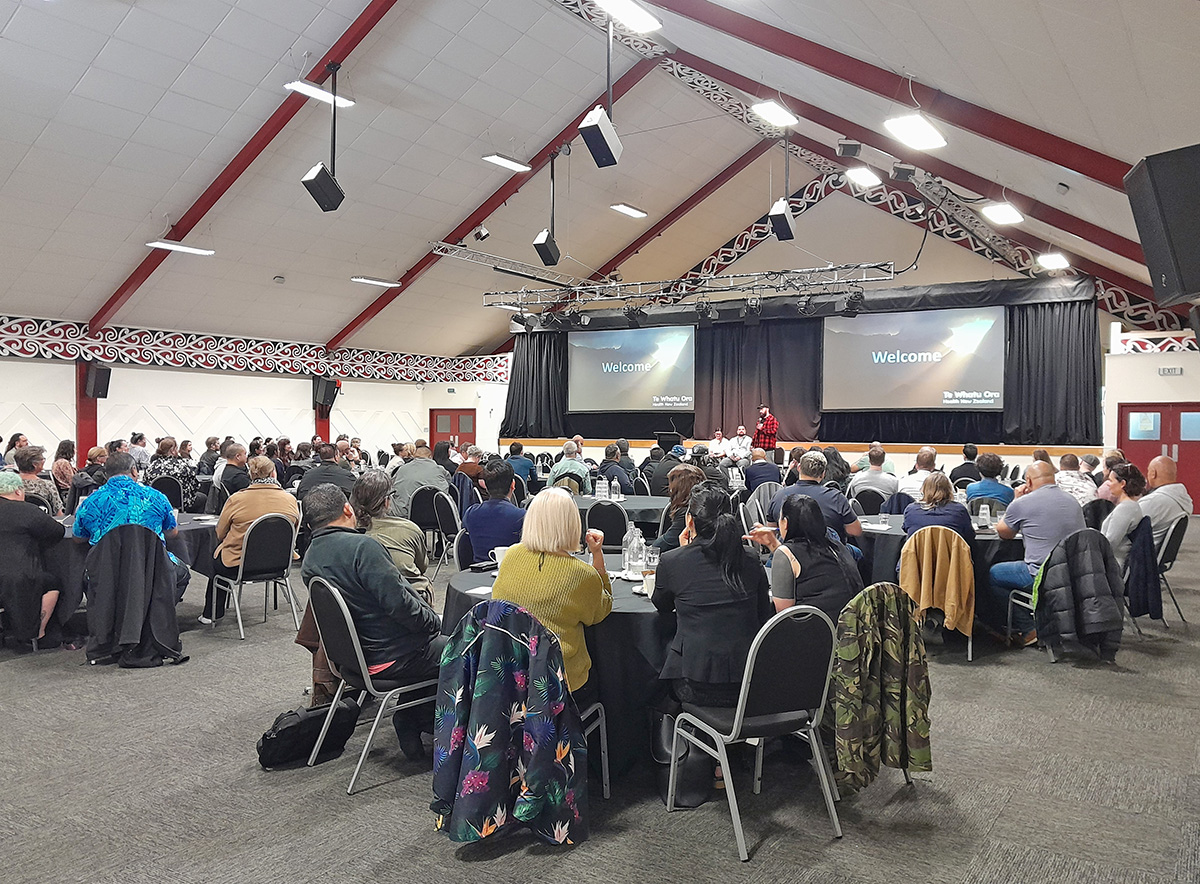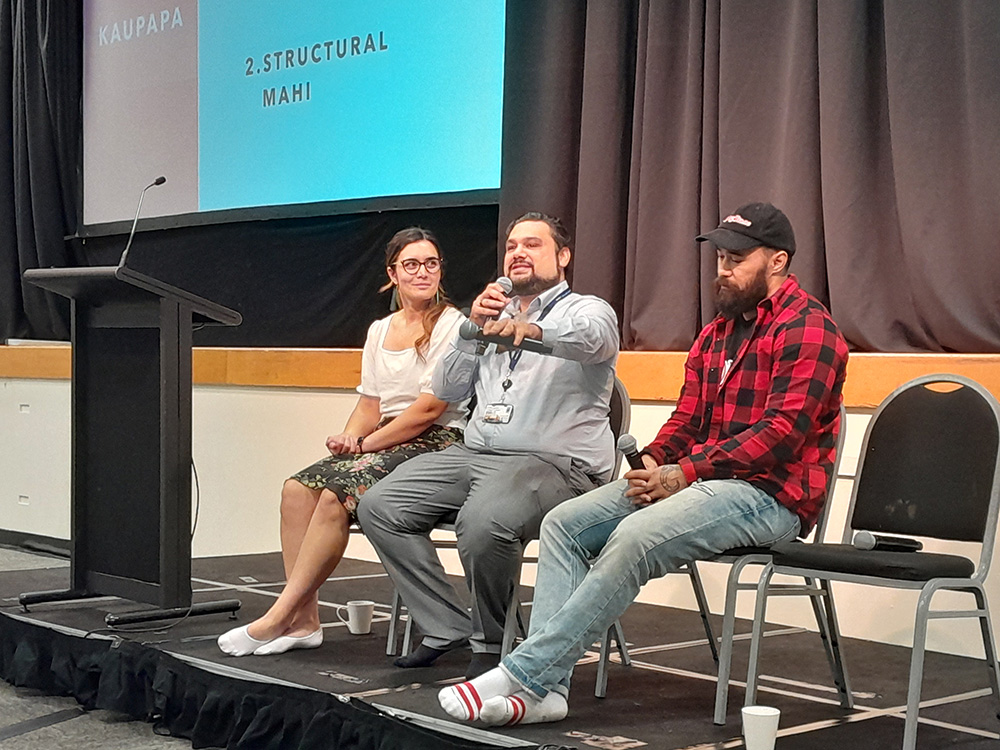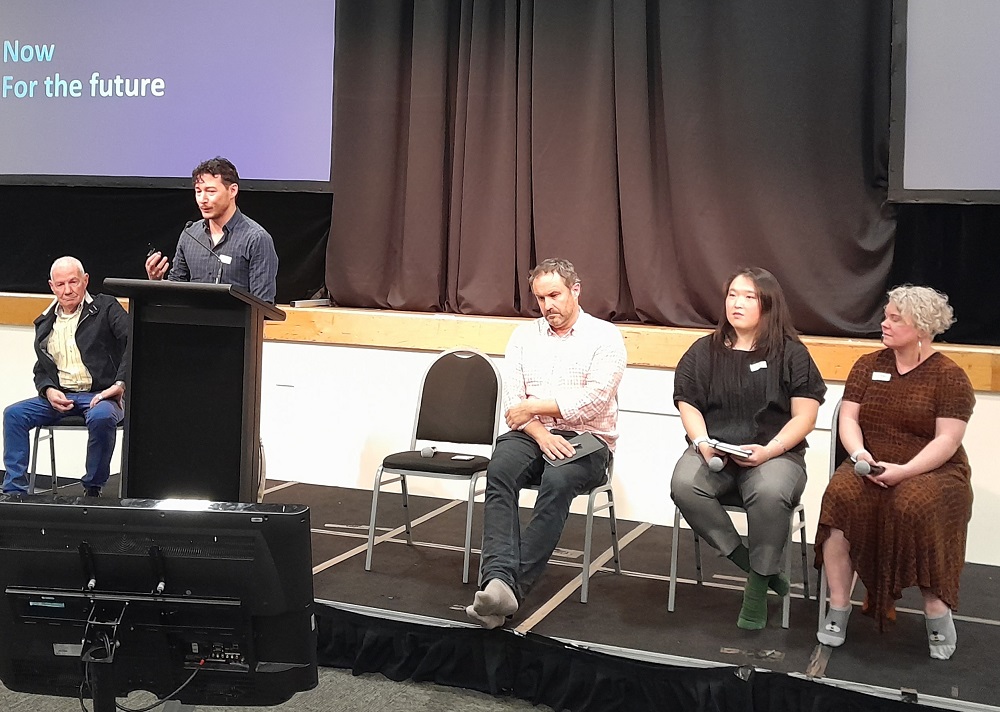Pictured L-R: AOD Collaborative members Jeremy Tumoana, Carole Koha, Sam McBride and Peter Barnett, together with symposium organiser Annie Murfitt.
 It offered AOD practitioners in the region a chance to upskill and undertake professional development, as well as a valuable opportunity to come together and make connections.
It offered AOD practitioners in the region a chance to upskill and undertake professional development, as well as a valuable opportunity to come together and make connections.
Over 150 attendees represented a range of organisations, from NGOs to government agencies and community providers.
This symposium was organised by the AOD Collaborative, a peer- and provider-led collective impact group of AOD stakeholders from across the Capital, Coast, Hutt Valley and Wairarapa district. The Collaborative has identified workforce development and shared training opportunities as key priorities to improve the AOD system of care.
 Panel session: Integrating Cultural & Clinical Care
Panel session: Integrating Cultural & Clinical Care
The Symposium featured presentations and panel sessions from a lively line-up of expert speakers with lived experience, clinical, and/or academic perspectives.
Following a pōwhiri and a brief introduction to Ngāti Toa history by kaumatua Bill Nathan, the first session saw a panel of clinicians sharing their expertise in delivering AOD support in a way that meets the cultural needs of Māori tāngata whaiora.
Elle Brittain (Lecturer at Te Kunenga ki Pūrehuroa, Massey University), Mike Ngawati (Clinical Lead for Te Atea Marino Māori addiction service) and Chris Thomas (Clinical Supervisor, Te Atea Marino), all pictured above, came together to discuss ways in which their services are engaging Māori, interventions developed by Māori for Māori, and Mana-enhancing care.
Jason George of the New Zealand Drug Foundation gave a presentation on the Drug Testing Programme, in which people bring drugs they have bought to a central Wellington location to have them tested and check whether they are as described. They can then make a more informed decision about taking these drugs.
As well as lowering the risk of harm, drug checking is free, legal, confidential and non-judgmental. “It’s not a guarantee - but it’s one way to keep people a little bit safer,” said Jason.
 Panel Discussion: Experience in working with rangatahi
Panel Discussion: Experience in working with rangatahi
Four practitioners then shared their expertise in walking alongside young people to recovery.
Ben Birks Ang of New Zealand Drug Foundation shared information about assessments, formulations and intervention planning. Child and Adolescent, and Addiction Psychiatrist Grant Christie presented on behavioural addiction, e.g., gaming or social media.
AOD/CEP specialist practitioner Jo Claridge discussed what rangatahi want from services, before Whāraurau’s Romy Lee presented on the transition into adult services.
Rangatahi share their experience of youth services
The Symposium was addressed by two rangatahi from 502, Porirua's Youth One Stop Shop (YOSS). 502 offers a place for any young people aged 10-24 to access free healthcare and social support in Porirua.
The rangatahi shared their valuable experiences and perspectives, which made a huge impact at the event. Both rangatahi were offered jobs by attendees as a result and recognition of their leadership qualities.
Initiatives across the sector were shared in a series of brief presentations. These included Matt Petrie from Wellington City Mission on the new residential service Te Pā Maru; Jo-Anne Ganc from Downtown Community Ministry on DCM’s Harm Reduction Service; Carl Greenwood from the New Zealand Needle Exchange Programme on the topic of Hepatitis C; and Sam McBride from Te Whatu Ora Addiction Services about Naloxone.
The Symposium was well received, with positive feedback including:
“The symposium worked out well – you all make it work through bringing your mana e hoa mā. Great hui and woke our spirits – whakaoho wairua.”
“I got to network - something we don't usually have time to do.”
“I really think today was even better than last year's initial symposium. I loved the panel discussions and was typing furiously taking notes.”